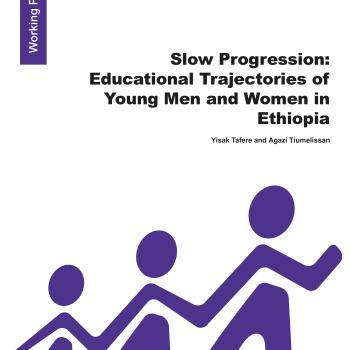
As children, the young women and men in the Young Lives study often had high aspirations for their lives after school, but many have found themselves unable to fulfil their dreams. Drawing on Young Lives longitudinal qualitative and survey data in Ethiopia, this working paper finds that more than half of the young people in the study dropped out of school early and that many students are older than the intended age for their school year. Because of their prolonged school trajectories, several are still attending school as adults. Only one has completed university education. Prolonged educational trajectories also mean young women are susceptible to marriage before finishing school
The paper examines the influence of workload, teaching quality, and illness and injury and asks: Why do young people repeat classes or drop out of school early? What effect do poverty, location, gender and other factors have on school progression? And finally, what stops these young people completing their education?
This working paper and the accompanying policy brief are part of a set of eight working papers and eight policy briefs on gendered transitions into young adulthood in Ethiopia.

As children, the young women and men in the Young Lives study often had high aspirations for their lives after school, but many have found themselves unable to fulfil their dreams. Drawing on Young Lives longitudinal qualitative and survey data in Ethiopia, this working paper finds that more than half of the young people in the study dropped out of school early and that many students are older than the intended age for their school year. Because of their prolonged school trajectories, several are still attending school as adults. Only one has completed university education. Prolonged educational trajectories also mean young women are susceptible to marriage before finishing school
The paper examines the influence of workload, teaching quality, and illness and injury and asks: Why do young people repeat classes or drop out of school early? What effect do poverty, location, gender and other factors have on school progression? And finally, what stops these young people completing their education?
This working paper and the accompanying policy brief are part of a set of eight working papers and eight policy briefs on gendered transitions into young adulthood in Ethiopia.

